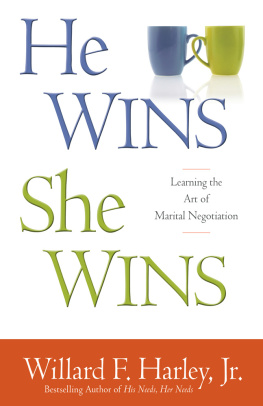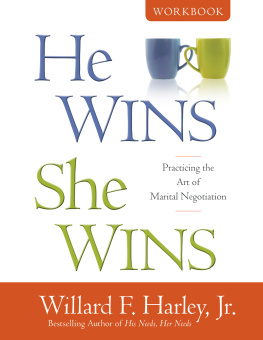1. Identifying the Problem
2. Men and Women Need Each Other
3. Why Win-Lose Doesnt Work
4. Keeping Romantic Love in Mind
5. A Win-Win Strategy
6. Negotiators, Take Your Places
7. Exceptions to the Rule
8. Conflicts over Friends and Relatives
9. Conflicts over Career Requirements and Time Management
10. Conflicts over Financial Management
11. Conflicts over Children
12. Conflicts over Sex
13. How to Negotiate When You Are Emotional
14. How to Negotiate When No One Wants to Raise the Issue
15. How to Negotiate When You Are Indecisive
16. How to Negotiate When Doing Nothing Is What One Spouse Wants
17. How to Negotiate When Youre Not Enthusiastic about Much
18. Putting Your Skills to Work
Other Books by Willard F. Harley, Jr.
Introduction
C onflicts between spouses are inevitable. My wife, Joyce, and I face at least one every hour were together. Our perspectives on how a problem should be solved are often entirely different. But in spite of those differences, weve become experts at resolving conflicts almost as soon as they arrive. And the skills weve developed in handling disagreements quickly and effectively have helped make our marriage everything wed hoped it would be.
But what if we didnt know how to do that? What if our conflicts remained unresolved? What if we fought with each other or stonewalled each other instead of finding solutions? Conflicts would then pile up over the years. And by now, after fifty years of marriage, we would be drowning in unresolved conflicts. We wouldnt be able to tolerate living with each other.
When I was young, it was the norm for couples to marry, have kids, and raise those children together. Today, by contrast, the majority of adults are single, over 40 percent of children are raised by a never-married parent, and the percentage of adults choosing to marry is still dropping steadily. Those who do marry face the very real possibility of divorcing at some point.
In this book, I will focus attention on one of the reasons for this sea change in our culturefailure to negotiate successfully. When faced with conflicts, most couples do not know how to resolve them to their mutual satisfaction.
This is nothing new, of course. Marital therapists have been aware of this problem since the rate of divorce took off in the 1960s, and many books have been written to help couples communicate, understand, listen, and respect each other more effectively. So what can I offer that has not already been said?
Whats different about my approach to resolving marital conflict is its ultimate goal: for a couple to be in love with each other. While most therapists view the resolution of martial conflict to be an end in itself, I view it as a means to an end. If a resolution builds your feeling of love for each other, I approve of itits been done the right way. If it fails to build that love, however, I believe youve made a mistake.
Throughout my counseling career, Ive seen many couples who have no difficulty communicating with respect yet want to divorce because they have lost their love for each other. But Ive never witnessed a couple who is in love and wants to divorce.
By reading this book, and applying its lessons to the way you handle conflicts, you will learn how to communicate effectively and resolve your conflictsguaranteed. But you will learn something else that is far more important. You will learn how to do it in a way that will sustain your love for each other.
7
Exceptions to the Rule
N ever do anything without an enthusiastic agreement between you and your spouse.
The Policy of Joint Agreement (POJA) is simply a rule to help couples remember that just about everything they do affects each other. And their wisest choices are those that take each others feelings and interests into account. In other words, win-win outcomes in marital problem-solving are far superior to win-lose outcomes. The POJA reminds couples of that fact.
When a mutually enthusiastic agreement is reached, everyone would agree that a couple has discovered an ideal outcome. But anyone who has had a marital conflict knows all too well that enthusiastic agreements are often difficult to discover. And the default condition, never do anything, can sometimes have very unpleasant, if not disastrous, consequences.
With those dangerous consequences in mind, I recommend a sensible exception: the POJA should not be followed if doing nothing puts the health or safety of a spouse at risk. When a spouse is being subjected to physical or emotional abuse, infidelity, or abandonment, it makes no sense to follow this rule. Self-protection trumps thoughtfulness in those cases.
If a spouse is the victim of physical abuse, that spouse should report the abuse to authorities and separate for his or her own protection, even if the abusing spouse does not agree to that response. The same can be said in the case of infidelity or drug addiction. Some of the most effective ways to treat those problems and provide protection are usually opposed by the unfaithful or addicted spouse.
But in addition to health and safety issues, there is also another situation in marriage where a temporary suspension of the Policy of Joint Agreement can make sense: when you are trying to find a way to meet each others most important emotional needs.
What should you do when your spouse has an emotional need that you are not enthusiastic about meeting? Does the POJA get you off the hook? Or are you obligated to meet each others important emotional needs even if you are not enthusiastic about it?
The answers to these questions are found in understanding the purpose of the Policy of Joint Agreement. Its a rule to help you resolve conflicts with mutual care and consideration. The default condition, dont do anything, is not designed to be a permanent solution to any marital problem. It is what you do while you are trying to discover a solution.
If youve read my book His Needs, Her Needs , you already know that I put a great deal of emphasis on spouses meeting each others most important emotional needs. Failing to do so should not be an option in marriage. But I also emphasize the importance of meeting each others emotional needs with mutual enthusiastic agreement. So what should a spouse do when he or she does not enjoy meeting an emotional need? The solution may require doing something reluctantly on a trial basis as part of a plan to find an enjoyable outcome. But the trial should not persist very long. Either it should show promise almost immediately, or the couple should go back to brainstorming for other methods.















